So many courageous individuals have been part of AFSC over the past century—driving our work for a world that respects the rights and dignity of all people. Here are just some of the people who have shaped—and continue to influence—AFSC today.
Michael McConnell
Visionary antiwar activist
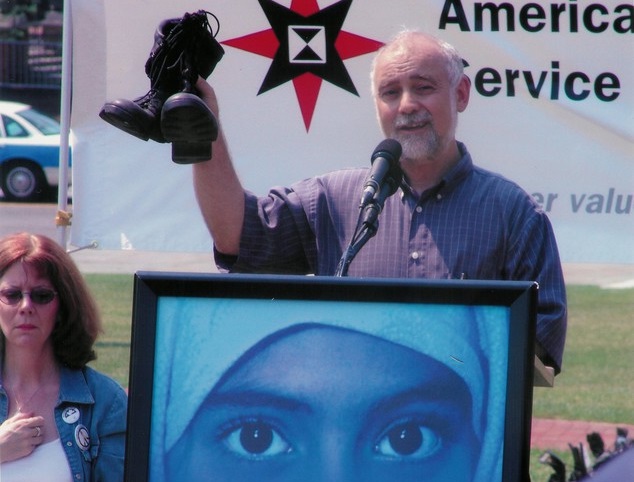
“You have to show the human face of an issue to people to both engage them and to help them understand the big picture.”
In 2004, the death toll from the Iraq War kept rising. But because returning coffins were banned from being filmed, the real human cost of the war was hidden. Michael McConnell, AFSC’s regional director in the Midwest, believed that making these losses visible would change opinions about the war.
Michael was the visionary behind AFSC’s widely acclaimed exhibit “Eyes Wide Open.” The exhibit started when AFSC staff and volunteers placed 504 pairs of empty combat boots on the Federal Plaza in Chicago, each pair representing a U.S. life lost. “Eyes Wide Open” attracted national attention—and, by 2006, would grow to include deaths among Iraqis and tour nearly every state in the country.
Michael once told an interviewer: “This is a public memorial that allows all of us to have some sense of public grief and mourning. And the public grief leads to political questions—why this war. You have to show the human face of an issue to people to both engage them and to help them understand the big picture.”
Michael’s antiwar activism began in college, when he was exposed to the realities of the devastation—and role of the U.S.— in the Vietnam War. He was ordained a minister in the United Church of Christ and became a key leader in the Central America sanctuary movement of the 1980s.
In 1990, Michael joined AFSC, serving for more than two decades as one of our chief strategists for work on ending war and violent response to conflict —from developing “Eyes Wide Open” to campaigns on military spending. As a regional director, he supported programs dealing with the criminal justice system, immigrant rights, and economic justice across the region and throughout AFSC, mentoring staff and championing opportunities for young people to develop their skills in working for peace with justice.
Michael, who passed away in 2013, said: “I love reading about people who have overcome incredible situations to sometimes win—sometimes maybe not win but to make a statement that then lives on and inspires other people. Our victories are always going to be episodic, partial, temporary maybe. But it seems at each step of the way, we have advanced the world a bit and made it more fair, more equitable, more peaceful.”
Erika Almirón
Immigrant rights leader
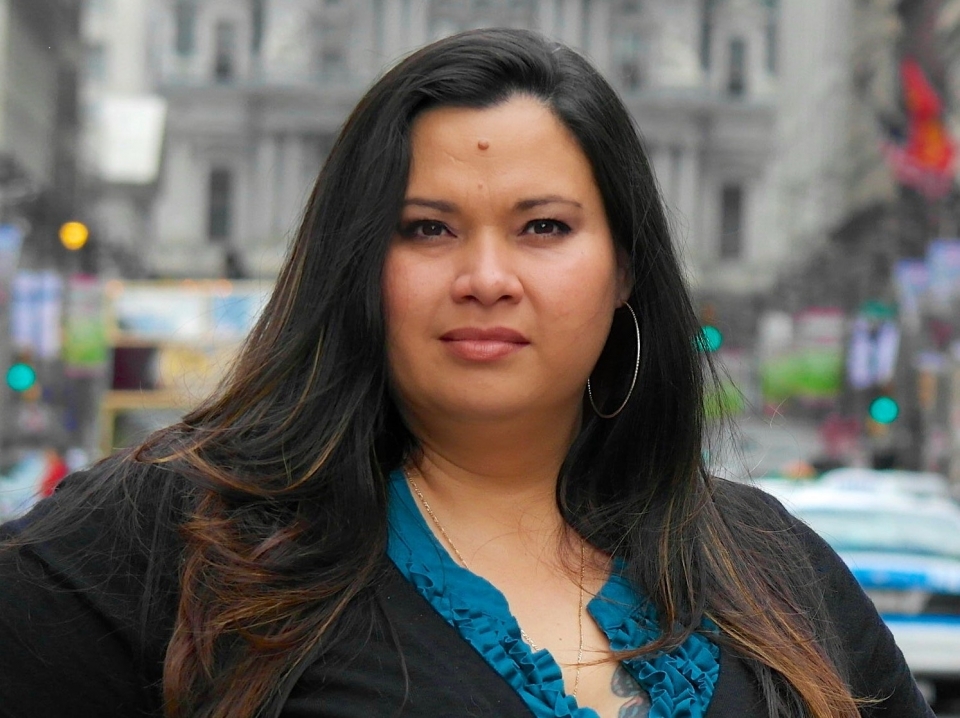
“Since AFSC, I have spent a lot of my life focused on leadership development and building up the leaders for the movement.”
When Erika Almirón was in high school, she organized a student walkout to protest the closing of her school. In college, she was active with the Latino Student Organization. But she never thought of herself as a social justice activist until she began working at AFSC in 2003.
“The term ‘social justice’ wasn’t even in my vocabulary until I got to AFSC,” says Erika. “Being a woman of color, working-class, and the child of immigrants, I just wanted to figure out ways to support my community.”
At AFSC, Erika worked as a program assistant, providing administrative support to staff advocating for immigrant rights and ending mass incarceration. She was also part of the Third World Coalition (TWC), formed by AFSC staff and committee members of color to guide the organization’s work from the perspective of people of color. She took part in her first immigration protest with AFSC in Philadelphia in 2006—it was just one of the many massive demonstrations that happened across the country that spring.
“To this day, I appreciate all of the TWC folks who saw something in me and made sure I had these opportunities,” Erika says. “I learned enough to start the work that I do today.”
For the past seven years, Erika has served as the executive director of Juntos, a Latinx, immigrant-led organization in Philadelphia. The group was a key leader in a successful grassroots campaign that led the city to pass one of the most progressive “sanctuary city” laws in the country. This year, she is running for Philadelphia City Council, where she hopes to spur even more change.
“Since AFSC, I have spent a lot of my life focused on leadership development and building up the leaders for the movement,” Erika says. “I think about how important it was for me to be seen and for somebody to see something in me. I want to make sure the people who walk through my doors today have as many resources as possible, so that when we’re gone, there are still people here to lead the fight.”
Stephen Cary
AFSC leader and Board clerk
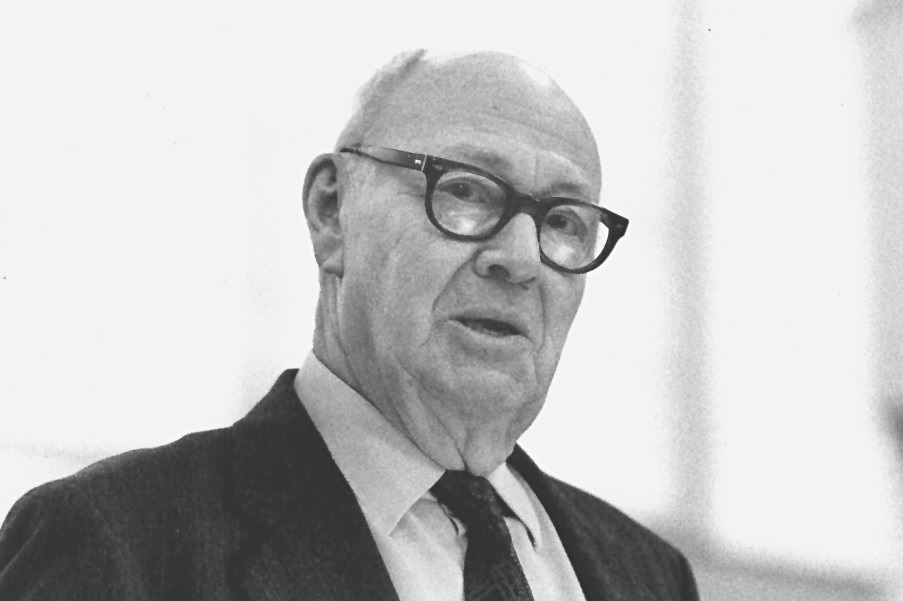
“To experience what I had experienced led me to a commitment to spend the rest of my life laboring in the vineyard of peace.”
Born to a Quaker family in Philadelphia, Stephen Cary led a life of courage, conviction, and action—helping to shape AFSC’s work for nearly 50 years.
Steve came to AFSC as a conscientious objector during World War II, doing manual labor in Civilian Public Service camps in the Northeast as an alternative way to serve the country during war. In 1946, he oversaw our American Quaker relief work in Europe, operating feeding programs for children and helping cities rebuild after the war. Quakers were awarded the Nobel Peace Prize for these humanitarian efforts in 1947.
“Those years gave my life new direction,” Steve later wrote. “To experience what I had experienced led me to a commitment to spend the rest of my life laboring in the vineyard of peace.”
Steve was a guiding voice for AFSC through the conflicts and social movements that defined the following decades. In 1955, he traveled through Russia as part of an AFSC delegation to promote understanding between the U.S. and the Soviet Union. And he chaired the AFSC committee, which included Bayard Rustin, that wrote “Speak Truth to Power,” the influential document that called for nonviolent alternatives to end the Cold War.
He was active in the Civil Rights Movement, marching with Martin Luther King, Jr. in Selma, Alabama (where colleague James Reeb died after an attack by white segregationists). When King was assassinated in 1968—just weeks before the start of the Poor People’s Campaign—Steve implored faith leaders to move forward, writing “It is our conviction that one million must replace the one who has been shot down.”
Steve would later spend 15 days in jail for civil disobedience at the Washington, D.C. demonstration. It wouldn’t be his last time in jail. In 1972, he was arrested for protesting the shipment of weapons to Vietnam by lying down on train tracks as a locomotive carrying bombs approached.
Steve left AFSC in 1969 to work at Haverford College, where he retired as vice president in 1981. He returned to AFSC as a volunteer in 1979, serving as clerk of the AFSC Board and Corporation for nearly 12 years. He died in 2002.
As Jack Coleman, editor of Steve’s memoirs “The Intrepid Quaker,” wrote: “To know his story is to become aware that you have lost the right to ever ask again, ‘What difference can one life make?’ This man, part of a small group of peace pursuing people, put a check on some of the worst abuses that stem from love of arms rather than arms of love.”
Anna Galland
Executive director of MoveOn Civic Action
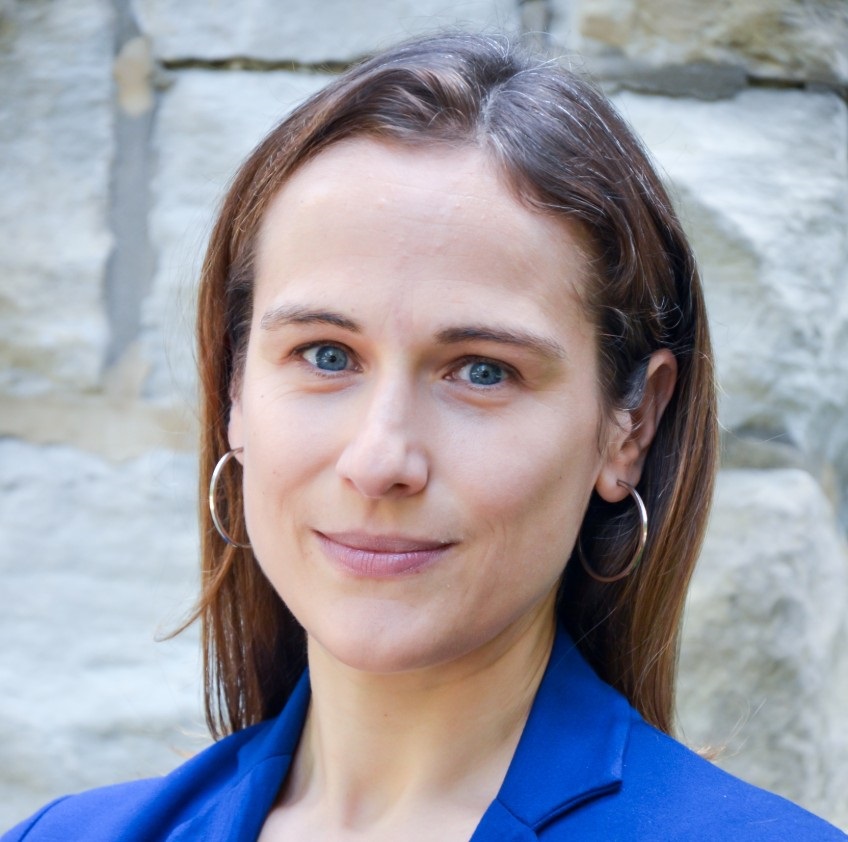
“One thing I value about AFSC is that it has been doing the patient work of building community and advancing a vision of how the world can be.”
As the head of MoveOn Civic Action, Anna Galland oversees an organization that has helped millions of people across the U.S. create social change and, through its sister organization MoveOn Political Action, helps elect progressive candidates. In 2002, she was a community organizer with AFSC, mobilizing communities in Rhode Island to protest the U.S.’s growing “war on terror” and call for nonviolent alternatives.
Anna had just graduated from Brown University, where she had some experience organizing and campaigning, but AFSC represented her first “proper job as a community organizer.” Her nearly three years with AFSC taught her a lot.
“I learned on the fly how to build coalitions, how to speak from a moral perspective, and how to mobilize,” she says. “Some of the first rallies I organized were through AFSC against the Iraq War. I remember looking around a church in downtown Providence one day, seeing the rafters packed, and feeling so grateful for AFSC’s investment in community organizing.”
In 2007, Anna joined MoveOn, where she has led issue advocacy and electoral campaigns—including working to end the Iraq War, helping to pass the Affordable Care Act, defending the U.S.’s diplomatic agreement with Iran, and supporting presidential campaigns. She also built MoveOn’s open petition platform, which has become a critical tool for tens of thousands of grassroots-led campaigns across the country—especially as communities continue to resist Trump administration policies.
In January, Anna announced that she and co-director Ilya Sheyman will transition out of their leadership after six years of building and transforming MoveOn—quadrupling its budget, tripling its staff, and driving innovative and effective campaigns. She plans to write and reflect on lessons from her time at MoveOn once she steps down.
“We are living in a political crisis, but it’s layered on top of a moral crisis,” Anna says. “In this moment, AFSC has an important role to play in doing the work and having a clear vision for the kinds of values we need to live into. One thing I value about AFSC is that it has been doing the patient work of building community and advancing a vision of how the world can be—day in and day out—for a long time.”
José Trinidad Sanchez and Mary McCann Sanchez
Peacebuilders in Central America
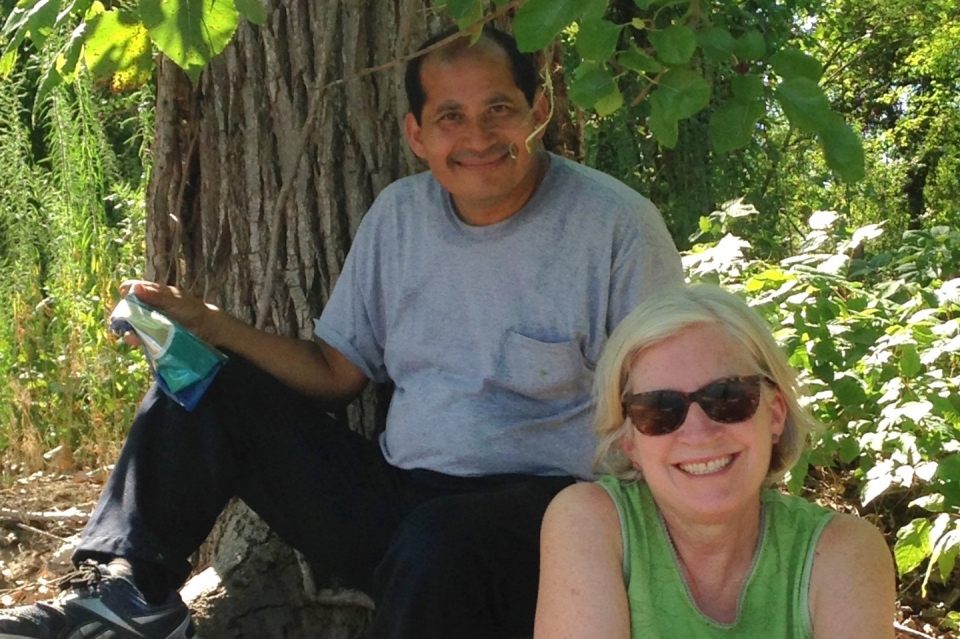
“Of all the work we’ve done, we’re most committed to AFSC because of its strong anti-militarism position.
Nonviolence is the source of strength and joy in our lives.”
During the heaviest periods of the Central American civil wars and into the period of post-peace accords, José Trinidad Sanchez and Mary McCann Sanchez oversaw AFSC’s work in Honduras, El Salvador, and Guatemala.
The couple met in 1984, when Mary—who had grown up in Wisconsin—traveled to Honduras with AFSC as a volunteer translator. At the time, Trinidad—who had grown up farming in the Honduran countryside—worked for Catholic Relief Services, an AFSC partner, assisting Salvadoran refugees.
Mary says: “AFSC played an integral role to uphold the rights of refugees and denounce human rights violations in the region. It was a natural place for me to express my concern about U.S. intervention in Central America.”
For several years, Mary traveled between Honduras and AFSC’s Chicago office, where she coordinated efforts to assist refugees and organized dozens of speaking tours and events to build resistance to U.S. involvement in Central America. In 1990, she became AFSC’s Central American representative, and was later joined by Trinidad as co-representative.
Over the next decade, Trinidad and Mary administered AFSC funding to local Central American organizations, including more than $1 million in aid distributed after Hurricane Mitch. They also supported the training of thousands of community members as “barefoot doctors,” midwives, and mental health counselors to improve access to health care in the region.
One of the most lasting impacts of their work stemmed from AFSC’s Dialogue and Exchange Program (DEP), which initiated a regional discussion of the devastating impacts of trade agreements. The talks led to the creation of COMAL (Alternative Community Marketing Network), a network of Honduran farmers and small cooperatives.
“COMAL is an example of people discovering how powerful they can be when they are united,” Trinidad says. “As a united force for small co-ops throughout the country, they could discuss what they envision for each other and what they want for the future.”
Today COMAL is an independent organization that trains farmers, facilitates access to credit and markets, and helps thousands of Hondurans develop a just alternative rural economy.
Trinidad and Mary now live in Chicago, where both work in social services that support immigrant children seeking family reunification.
“The social scars of the wars are long lasting,” says Mary. “Of all the work we’ve done, we’re most committed to AFSC because of its strong anti-militarism position. Nonviolence is the source of strength and joy in our lives.”
Bernard Lafayette
Nonviolent activist and civil right leader
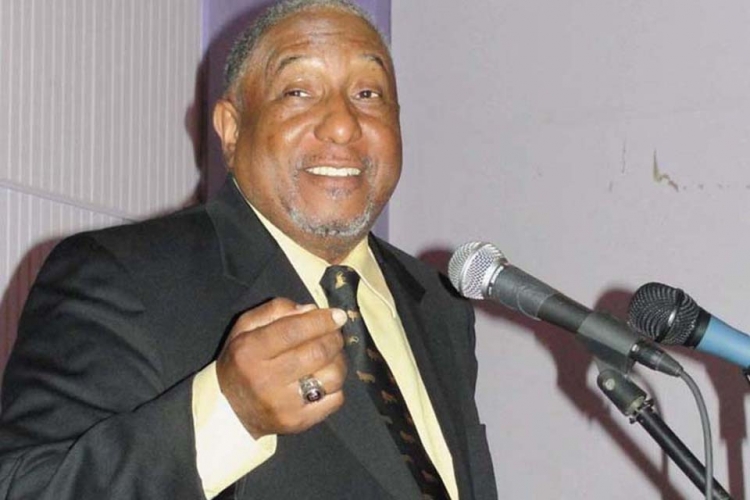
“The goal of nonviolence is to win people over by showing them love.”
For more than half a century, civil rights leader Bernard Lafayette has courageously spread his message about the power of nonviolence to overcome injustice—from putting his body on the line as a Freedom Rider to leading voter registration efforts in Alabama to training countless individuals in strategies for nonviolent social change.
In the late 1950s, Bernard was a student activist in Nashville, where he and future leaders in the Civil Rights Movement—including John Lewis and Diane Nash—were trained in nonviolent action by James Lawson of the Fellowship of Reconciliation. In the early 1960s, Bernard joined the newly formed Student Nonviolent Coordinating Committee (SNCC), serving as director of its Alabama Voter Registration Project and running voter registration clinics in Selma.
AFSC recruited Bernard in the summer of 1963 to bring his work north to Chicago. He conducted nonviolent workshops for groups throughout the city—tenants struggling with deplorable housing conditions, youth facing violence on the West Side, parents trying to integrate a swimming pool on the South Shore, and Quaker meetings.
Bernard was a critical part of AFSC’s groundbreaking work to organize tenants—which laid the foundation for Martin Luther King, Jr. and the Southern Christian Leadership Conference (SCLC) to bring their own work to Chicago. In 1966, King hired Bernard to oversee the SCLC’s nonviolent direct action program in the city. Two years later, Bernard became national coordinator of the Poor People’s Campaign—work that he and others continued after King’s assassination that year.
Bernard continued to promote his message of nonviolence in the decades that followed, teaching and holding positions at several universities where he established curricula and programs focused on nonviolence and peace education.
“The goal of nonviolence is to win people over by showing them love,” Bernard once said in a speech. “We don’t feel there are people who are evil. There are people who do a lot of evil things. … They are conditioned by their environment, so therefore they also can be unconditioned in that sense. They can change, and we have to believe that people can change.”